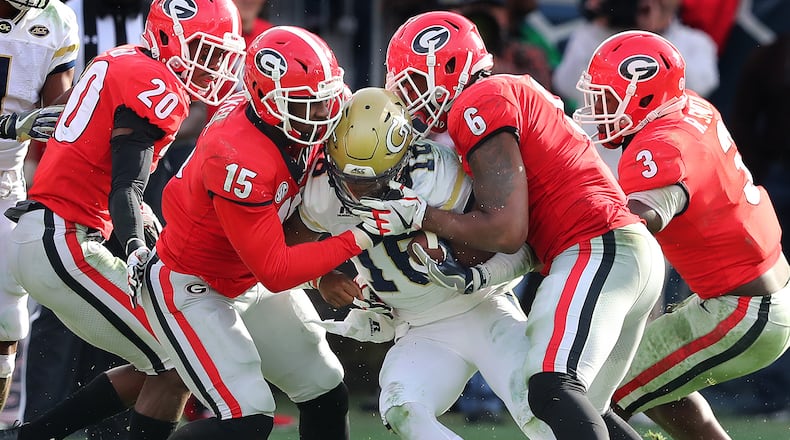It’s a sad day. But it’s a good day.
It’s a sad day because a young man is struggling.
Natrez Patrick, who had multiple arrests, failed drug tests and related incidents involving marijuana, reaffirmed the deep and dark hole he had fallen into. It was learned Thursday that he had failed a drug test for the second time in three weeks, this time for opiates and alcohol.
It’s a good day because a young man is getting help.
Georgia announced Thursday night that Patrick, the Bulldogs' linebacker, has agreed to enter an in-patient drug treatment program in Augusta. At the very least, it gives the appearance of acknowledgement on his part that he has a problem that needs to be addressed and taken seriously. Otherwise, he will lose things far more important than a chance to play college football.
It's also a good day for Georgia football. I shared concerns last week that coach Kirby Smart and the school's administration might ignore continuing evidence of Patrick's problem, ignore his failed drug test that was a part of a probation violation in Athens-Clarke County – which was outside the parameters of UGA's drug policy – and allow him to play in the Rose Bowl Jan. 1 against Oklahoma.
That would’ve been so wrong for both the player and the university. It would’ve placed a football game above Patrick’s health and well-being.
Many fans screamed on social media at the suggestion Patrick should be sidelined.
Because, well, “It’s a big game!”
Or, well, “It’s only marijuana!”
Or, well, “He passed the UGA-administered drug test initially following his arrest in Winder, and that’s all that matters! Go Dawgs!”
Never mind that a 20-year-old might be in the throes of drug dependency. Never mind that we’re talking about somebody’s life that extends far beyond four college football seasons, when most of the world stops paying attention.
This shouldn’t have been a time for another social media referendum on the legalization of marijuana. It wasn’t a time for attorneys to look for legal loopholes. It should have been a time for simply looking at a situation and doing what was right.
This was right.
Patrick is a bright young man and a good football player. If he takes care of himself, this experience will only enrich his life. Should he learn something in treatment and work a strong recovery program, there’s no reason Georgia shouldn’t allow him to return to school and football next year, if that’s what he wants to do.
The legal side says Patrick didn’t violate Georgia’s third-strike policy and therefore should not be dismissed from the school. But what’s far more important is that if he comes through treatment and keeps doing the next right thing, he would be a terrific example for so many others in his situation, particularly young adults on a college campus.
Ron Courson, Georgia’s director of sports medicine, released a statement on Patrick, via Dawgnation’s Seth Emerson, that read: “Due to confidentiality requirements, we can’t comment, other than to say we continue to follow policies, and we have no higher priority than the well-being of our student-athletes.”
And here we note: Georgia did the right thing in 2016 when it suspended defensive lineman Jonathan Ledbetter six games for consecutive alcohol-related arrests, including a DUI. Smart, in his first season as head coach, said Ledbetter would receive treatment for a "serious problem."
Ledbetter has since returned without an incident. He played the final seven games last season and all of this year. He has 3-1/2 tackles for loss this season, including a sack in the win over Tennessee. Had his non-football issues not been addressed, football and school wouldn’t be here for him today and into future.
Patrick is now where Ledbetter was in 2016. Next season, there’s no reason why he can’t be where Ledbetter is today.
It’s a sad day. But it’s a good day.
Subscribe to the, "We Never Played The Game" on iTunes or listen from the new AJC sports podcasts page or the WSB Radio on-demand page.
About the Author
Keep Reading
The Latest
Featured


